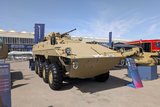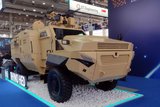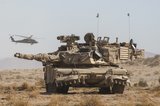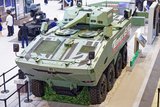BAE Systems awarded RG-31 MRAP contract
Through its teaming agreement with General Dynamics Land Systems Canada (GDLS-C), BAE Systems, Land Systems South Africa won a contract worth more than ZAR900 million ($130 million) for survivability and mobility upgrades to its RG-31 Mine Resistant Ambush Protected (MRAP) vehicles.
The upgrade kits will further enhance the survivability and mobility of the battle-proven RG-31 vehicles. As part of the modernization work in South Africa, a powerpack providing higher performance andnew suspension components and transfer cases, which were designed and manufactured by BAE Systems, will be incorporated into the upgrade kits.
"We appreciate our ongoing relationship with GDLS-C as well as the confidence that the US military has in the RG-31 vehicle. Readiness and Sustainment is an important part of our business and through these programmes we continue to protect the lives of US Soldiers," said Johan Steyn, Managing Director BAE Systems, Land Systems South Africa.
The RG-31 is a mature, combat proven mine protected armoured personnel carrier designed, developed and manufactured by BAE Systems in South Africa. In total, over 1,600 RG-31 vehicles have been delivered through GDLS-C under the MRAP programme, an additional 566 RG-31s have been delivered to US forces under separate contracts.
Source: BAE Systems
More from Land Warfare
-
![Singapore Airshow 2026: ST Engineering’s Terrex s5 highlights hybrid power’s role in future warfare]()
Singapore Airshow 2026: ST Engineering’s Terrex s5 highlights hybrid power’s role in future warfare
Hybrid-electric drive technology may address the growing energy demands of land warfare in future.
-
![CAVS rides a wave and prepares for surge requirements as orders roll in]()
CAVS rides a wave and prepares for surge requirements as orders roll in
The Common Armoured Vehicle System is continuing to rack up orders as the British Army looks likely to become an operator of the vehicle, while Italy and Ireland are also contenders.
-
![US DoD task force’s DroneHunter acquisition lays groundwork for Replicator 2 CUAS strategy]()
US DoD task force’s DroneHunter acquisition lays groundwork for Replicator 2 CUAS strategy
As the US Department of Defense looks to counter the growing threat of uncrewed aerial systems to improve homeland security, the DroneHunter acquisition could point to future commercial innovation.























